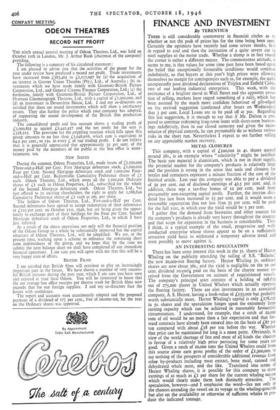FINANCE AND INVESTMENT By TERENTI US THERE is still considerable
controversy in financial circles as to whether or not the peak of prices has for the time being been seen. Certainly the optimists have recently had some severe shocks, first in regard to coal and then the intimation of a quite severe cut in steel supplies td the motor trade. Whether a slump is in fact round the corner is rather a different matter. The commonsense attitude, it seems to me, is that values for some time past have been based upon the belief that exceptionally favourable conditions would continue indefinitely, so that buyers at this year's high prices were allowing themselves no margin for contingencies such as, for example, the quite unexpectedly poor dividend declarations of Triplex and Enfield Cable, two of our leading industrial enterprises. This week, with the assistance of a brighter mood in Wall Street and the apparent cessa- tion of selling, markets have staged something of a rally, which has been assisted by the much more confident behaviour of gilt-edged on the revived suggestion (confirmed after hours on Wednesday) that 3 per cent. Local Loans are to be paid off at par. Regarding this last suggestion, it is enough to say that if Mr. Dalton is pre- pared to continue redeeming long-term loans with short-term borrow- ings indefinitely, then in our closed economy and given the main- tenance of physical controls, he can presumably do so without serious risks in the short run. Nevertheless I expect to see further selling on any appreciable market recovery.
METAL CLOSURES
'This company, with a capital of £too,000 in 4s. shares quoted around 28s., is an example where " selectivity " might be justified. The basic raw material is aluminium, which is not in short supply, the potential market for the company's products is relatively large and the position is strong in the sense that seals and closures for bottles and containers represent a minute fraction of the cost of the finished article. Last year the company was able to pay a dividend of 3o per cent. out of disclosed earnings of 43.5 per cent. and, in addition, there was a tax-free bonus of to per cent. paid from presumably non-recurring capital profit. Further, the interim divi- dend has just been increased to 15 per cent. and it would seem a reasonable expectation that not less than 35 per cent. will be paid for the full year, in which case the yield would be 5 per cent.
I gather that the demand from breweries and other sources for the company's products is already very heavy throughout the country and that scope for expansion 'in the business is considerable. This I think, is a typical example of the small, progressive and well- conducted enterprise whose shares appear to be on a sufficiently attractive yield basis to withstand a temporary adverse trend and even possibly to move against it.
AN INTERESTING SPECULATION
There has been some interest this week in the 5s. shares of Hector
Whaling on the publicity attending the sailing of S.S. Balaena,' the new 2o,000-ton floating factory. Hector Whaling 5s. ordinary shares are now about 36s., and the yield is negligible on the to per cent. dividend recently paid on the basis of the charter money re- ceived from the Government on account of requisitioned vessels. The company's principal asset consists of a holding of 198,633 out of 275,000 shares in United Whalers which actually operates the floating factory. There are also investments in an associated company, A. S. Hector, having a book-value of £155,00o but probably worth substantially more. Hector Whaling's capital is only £178,125 in 5s. shares and the speculation hinges upon the extremely large earning capacity which can be achieved in reasonably favourable circumstances. I, understand, for example, that a catch of 20,000 tons of oil would be no more than a fair expectation and that for- ward contracts have already been entered into on the basis of £67 per ton compared with about £18 per ton before the war. Whether that price can be maintained for long is a moot point. Obviously, in view of the world shortage of fats and meat of all kinds the chances in favour of a relatively high price persisting for some years are good. Given a catch of 20,000 tons the United Whalers could from this source alone earn gross profits of the order of L1,300,000, to say nothing of the prospects of considerable additional revenue from other by-products including meat extract, bone meal, canned and dehydrated whale meat, and the like. Translated into terms of Hector Whaling shares, it is possible for this company to show earnings of as much as Lz per share for the current whaling season which would clearly make them look distinctly attractive. The speculation, however—and I emphasise the word—lies not only in the chances attending the vessel on its voyage to the whaling-grounds but also on the availability or otherwise of sufficient whales to pro- duce the indicated tonnage.






























 Previous page
Previous page